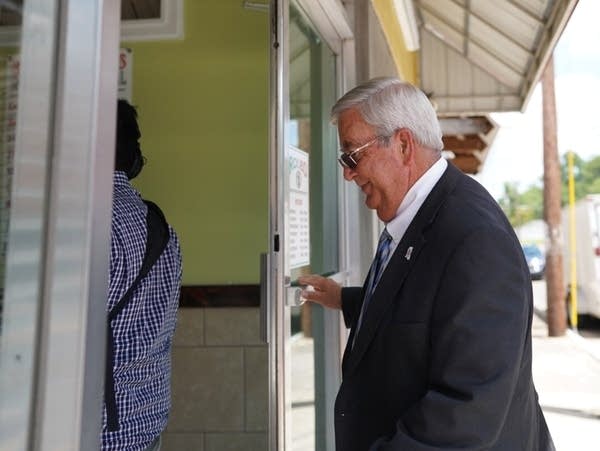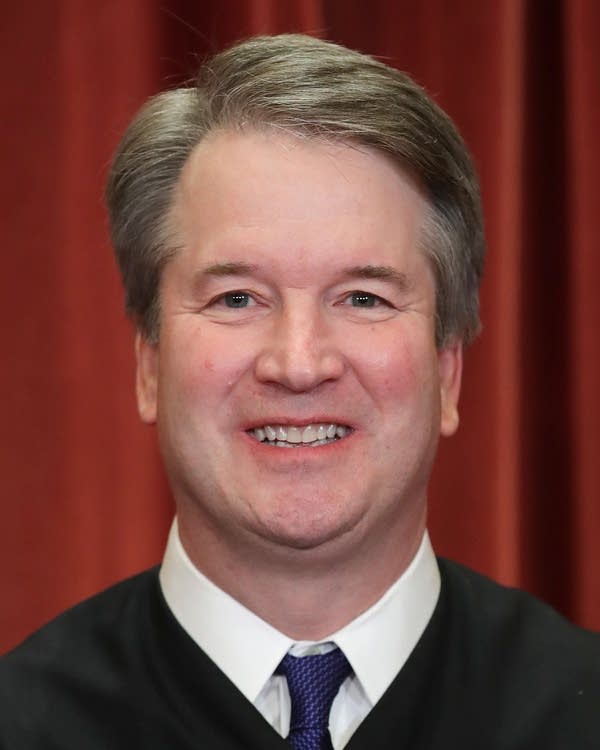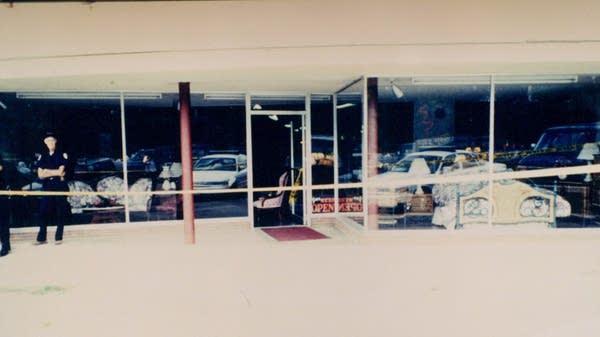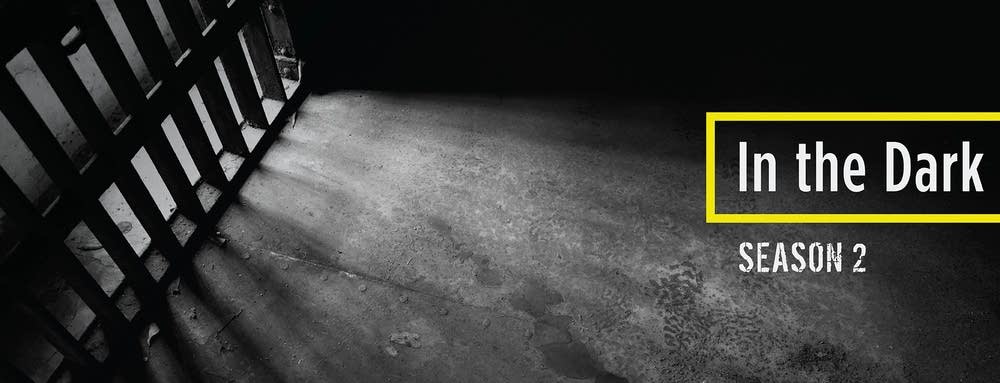Reversed
Curtis Flowers wins appeal at U.S. Supreme Court

The Supreme Court has reversed Curtis Flowers' 2010 conviction, ruling that prosecutors excluded African-Americans from the jury.
June 21, 2019 | by Curtis Gilbert, Dave Mann, Rehman Tungekar, and Parker Yesko
WINONA, Mississippi — When he got the call from his son Curtis on Friday morning, Archie Flowers was sitting at his dining room table in Winona, Mississippi.

It had been about an hour since the U.S. Supreme Court had thrown out Curtis' death sentence — the 49-year-old has been tried six times for a quadruple murder at a furniture store in 1996 and been in prison for 22 years.
In a 7-2 ruling, the justices reversed the conviction because they concluded that the white district attorney, who has prosecuted the case from the beginning, had violated Curtis' constitutional rights by intentionally removing African-Americans from the jury at the sixth trial, in 2010. It's the fourth time Curtis has had his murder conviction reversed.
Archie had heard about the decision almost immediately and had been fielding calls from jubilant friends and relatives. But there was one person he wanted to talk with most: his son.
Then his phone buzzed. The call was coming from Parchman prison, where Curtis was on death row. Archie answered, waited through the recorded warnings that the call was coming from a correctional institution, and finally heard Curtis' voice.
"What you got going on?" Archie said to him, as two reporters sat nearby.
A pause.
"It's probably all over town by now," Archie said, laughing.
Archie, a man of few words who had said little most of the morning, came alive. Smiling broadly, he talked with Curtis for about 20 minutes. They quickly dispatched with the news of the day and moved to their favorite subject: music. Archie has been a gospel singer for years, and he taught Curtis to sing, too. During the call, he gently teased his son, "You think you can beat your dad at singing, but I make you look bad."
Archie and Curtis often sing together during their prison visits. Curtis' parents have seen him every other week for most of his legal ordeal, though recently Archie has been making the drive without Curtis' mother, Lola, who died last July.
After they'd hung up, Archie said Curtis sounded good. "I know he was happy, because when I go visit him, he didn't have no joy like that," Archie said. "He's talking loud, talking about singing. ... He's happy."
Though he's prevailed in his appeal, Curtis won't be freed right away.
He'll likely be transferred from death row back to the Montgomery County jail, where he'll wait to hear if his 23-year-long legal odyssey has finally come to an end or whether he'll face a seventh trial.
The Flowers case was the subject of the second season of the APM Reports podcast In the Dark. Reporters spent a year in Mississippi investigating the case and uncovered compelling evidence of Flowers' innocence that helped bring the case to national prominence.
The man who may well decide Flowers' fate is the same prosecutor who's handled the case all along — Doug Evans. He can either drop the murder charges against Flowers, proceed with another trial or try to strike a plea deal with Flowers' attorneys.
Reporters for In the Dark tracked down the longtime prosecutor on Friday having lunch at a Mexican restaurant in Kosciusko, Mississippi, a small town southeast of Winona. Asked about the ruling, Evans said he disagreed with the Supreme Court's conclusions. "There's no question about [Flowers'] guilt. There never has been," he said. "Courts are just like me and you. Everybody's got opinions."
Evans responded specifically to the Supreme Court's ruling that he tried to exclude African-Americans from the jury, saying, "If they said that, that is not true." The prosecutor added that he hadn't yet read the court's opinion, and that he'd made no decision yet on whether to try Flowers a seventh time.

Matt Steffey, a professor at Mississippi College School of Law, said that with Evans, past may be prologue. "The best predictor of human behavior is recent relevant past behavior," he said. "And he's tried the case six times despite, before today, three reversals and two hung juries. And so, if six [trials] is good, there's nothing that makes me think that there won't be a seventh."
But the lawyers who have defended Flowers over the years rejoiced. "I feel good. I hate to say this, but I actually feel that I've been set free, too," said Ray Charles Carter, who has represented Flowers in past four trials. "The fact that somebody has stopped it is a wonderful thing."
Sheri Johnson, who argued Flowers' case before the Supreme Court in March, said: "I'm very happy that justice may finally reach Mr. Flowers. It's an enormous thing for a man who, in my opinion, has suffered wrongly for more than 20 years."
The four murders at Tardy Furniture, committed on the morning of July 16, 1996, shocked the small town of Winona. After months of investigation, law enforcement settled on Flowers as the prime suspect despite little direct evidence tying him to the crime. In fact, his only connection to the murders was that he'd worked at the store for a few days that summer.
Benny Rigby, whose wife, Carmen, worked at Tardy Furniture and was one of the four victims, told the Jackson Clarion-Ledger on Friday, "There is no justice. If he was white, he would have been executed by now.
"How would you feel if it was your wife?"
Flowers was first convicted and sentenced to death in 1997; that verdict and three subsequent ones were overturned. Two other prosecutions ended in mistrials. Each time he's been convicted, Flowers was judged by either an all-white or nearly all-white jury. His supporters have long argued that was no accident. On Friday, the highest court in the land agreed.
The ruling
The majority opinion, written by Justice Brett Kavanaugh, holds that Evans violated Flowers' rights by flouting a 1986 precedent, set forth in Batson v. Kentucky, that it's unconstitutional to strike jurors because of their race. The ruling reverses a 2017 decision by the Mississippi Supreme Court that denied Flowers' appeal.
The high court said that Evans' removal of an African-American woman — Carolyn Wright — was motivated in part by "discriminatory intent" and that Mississippi courts had erred in dismissing that conclusion.
Kavanaugh was joined in the majority opinion by Chief Justice John Roberts and justices Samuel Alito, Stephen Breyer, Sonia Sotomayor, Elena Kagan, and Ruth Bader Ginsburg.

Kavanaugh wrote that the removal of Wright from the jury in 2010, taken alone, might not have been enough to overturn the conviction. But considering the remarkable history of the case — including Evans' strikes of nearly every black prospective juror in Flowers' six trials and his more rigorous questioning of them — the court concluded that Evans' strike of Wright was influenced by race. Therefore, Kavanaugh wrote, it was unconstitutional.
"Our review of the history of the prosecutor's peremptory strikes in Flowers' first four trials strongly support the conclusion that his use of peremptory strikes in Flowers' sixth trial was motivated in substantial part by discriminatory intent," Kavanaugh wrote.
"Stretching across Flowers' first four trials, the State employed its peremptory strikes to remove as many black prospective jurors as possible. The State appeared to proceed as if Batson had never been decided.
"The State's relentless, determined effort to rid the jury of black individuals strongly suggests that the State wanted to try Flowers before a jury with as few black jurors as possible, and ideally before an all-white jury."
The majority cut across ideological lines.
Alito, one of the court's most conservative justices, not only joined the majority decision but wrote a brief concurring opinion. He wrote that he ordinarily would have sided with the state of Mississippi. "But this is not an ordinary case, and the jury selection process cannot be analyzed as if it were," he wrote. "In light of all that had gone before, it was risky for the case to be tried once again by the same prosecutor in Montgomery County."
Dan Epps, a legal expert and former Supreme Court clerk who's followed the case closely, said he thought the ruling, while striking, was narrow in scope and would apply primarily to Flowers' case. "I don't think the underlying legal standard is radically changed in any meaningful way," he said, adding that the court was simply acting on the existing Batson standards.

Johnson said there are likely other examples of discrimination in jury selection that never come to light. "The history of this case is what makes it unusual. In the absence of that extraordinary history, it's very difficult to detect racial prejudice. I think there are many cases in which prosecutors still have discriminated on the basis of race, and in the absence of that kind of noteworthy history, they get away with it."
Justice Clarence Thomas, the only African-American on the court, dissented in the case, joined in part by Neil Gorsuch. When the case was argued before the court in March, Thomas asked a question, the first from him in three years.
In his scathing dissent, Thomas wrote that the court should never have taken the case let alone overturned it. He argued the majority had proceeded to "second-guess the factual findings of two different courts on matters wholly collateral to the merits of the conviction."
Moreover, Flowers' attorneys presented no evidence of purposeful race discrimination by Evans, Thomas wrote. And he questioned the central point of the Batson decision that bias in jury selection violates defendants' rights.
Thomas also seemed to criticize In the Dark by suggesting that media attention on the case may have helped sway the majority. "Any appearance that this Court gives closer scrutiny to cases with significant media attention will only exacerbate these problems and undermine the fairness of criminal trials."
An unlikely advocate
Kavanaugh — assigned by Roberts the task of writing the majority opinion — may seem like an unlikely author of a decision opining on the Equal Protection Clause of the Fourteenth Amendment and condemning racial discrimination in the courtroom.

The court's newest member, Kavanaugh was nominated by President Trump and confirmed during a politically divisive confirmation process last fall. All but one Senate Democrat opposed Kavanaugh's nomination, as did numerous civil rights organizations.
In the past, Kavanaugh has represented an anti-affirmative action group and defended voter ID laws, which some argue make it more difficult for minorities to vote.
But during oral arguments in March, Kavanaugh was sharply critical of Evans' long history of removing black jurors in the repeated prosecutions of Flowers. He defended Batson as an important safeguard of fairness in the criminal justice system and condemned the racial stereotypes that Batson sought to end.
In fact, this wasn't Kavanaugh's first defense of Batson.
In a Yale Law Journal article in 1989, he argued for courtroom procedures ensuring the precedent would be enforced. His ruling today was similarly pragmatic: "We break no new legal ground," he wrote, but noted, "we cannot just look away."
Kavanaugh's opinion drew on more than a century of case law about race in jury selection, not just the current Batson precedent. He reached back to the 1880 decision in Strauder v. West Virginia for support. That case used the Equal Protection Clause — intended to ensure the rights of freed slaves after the Civil War — to rule it unconstitutional to bar African-Americans from jury service.
And, in a novel way, Kavanaugh drew on 1965's Swain v. Alabama, a case that was lost by a black defendant who failed, in the court's eyes, to prove racial discrimination in the way a prosecutor had used his peremptory strikes. The ruling in Swain said that a defendant needed to show that a prosecutor had racially discriminated across different cases over time — a nearly impossible task — to prove bias in his own trial. In 1986, Batson superseded Swain by ruling that a defendant can establish racial bias in jury selection on the facts of his case alone. Batson has been the law of the land since.
But during oral arguments, Kavanaugh connected the type of evidence Swain required to the type of evidence Flowers' attorneys presented: the prosecutor's long history of repeated discrimination over multiple trials. "Batson, as I read it, did not say you no longer take account of the history," Kavanaugh said during oral arguments in March. His statement foreshadowed a point that he wrote into law today, "the defendant may still cast Swain's 'wide net' .... We cannot take [the] history out of the case."
This was perhaps Kavanaugh's clearest contribution to existing precedent: That a prosecutor's history of race-based discrimination can and should be used in assessing the credibility of his stated reasons for striking black jurors.
Besides Evans' history in the case, Kavanaugh faulted Evans for questioning black prospective jurors more rigorously than white ones, seemingly creating pretexts for striking them.

The strike against Carolyn Wright
In keeping with precedent, the Supreme Court needed to find only one juror dismissed because of race; if there is a single illegal strike, then the conviction must be overturned. In fact, the court ruled that the very first strike Evans used, against a 44-year-old black woman named Carolyn Wright, was discriminatory and unconstitutional.
In Flowers' 2010 trial, Evans said he struck Wright for three reasons: She knew a lot of people connected to the case, she had worked with Archie Flowers and she had been sued by Tardy Furniture. Though Evans' reasons for striking Wright appeared reasonable, Kavanaugh wrote that they fell apart when examined more closely.
For example, Wright knew 34 people connected to the case. But several white jurors knew nearly as many. Kavanaugh wrote: "Three white prospective jurors also knew many individuals involved in the case ... the State did not ask [the white prospective jurors] individual follow-up questions about their connections to witnesses."
Evans also claimed that Wright worked with one of Flowers' sisters, which was not true. This was just one of several incorrect statements Evans made about black jurors he struck. "The State's pattern of factually inaccurate statements about black prospective jurors suggests that the State intended to keep black prospective jurors off the jury," Kavanaugh wrote.
In contrast to Wright
Larry Blaylock, a white prospective juror, stood in stark contrast to Wright, a fact not lost on Kavanaugh, who cited Blaylock in his majority opinion. Blaylock knew several of the witnesses and had a relative whom Evans prosecuted, yet the prosecutor asked few follow-up questions about Blaylock's connection to the case or his family's history with Evans.
In an interview with APM Reports, Blaylock said: "I knew basically everyone in the case. I never thought I'd get picked."
When similar topics came up with black prospective jurors in Flowers' sixth trial, Evans questioned these jurors extensively.
According to an APM Reports analysis, Evans asked black prospective jurors an average of 15 questions each and only asked white prospective jurors an average of 4.5 questions.
In Friday's ruling, Kavanaugh wrote, "By not asking white prospective jurors those same questions, the prosecutor can try to distort the record so as to thereby avoid being accused of treating black and white jurors differently."
Evans' propensity for removing black prospective jurors wasn't limited to the Flowers case. Reporters for In the Dark examined the juror strikes in 225 trials handled by Evans' office from 1992 through 2017. The analysis found that Evans or his assistants struck black prospective jurors at more than four times the rate they struck white ones.
What comes next
The Supreme Court's ruling will set off a chain of events, though not one that's guaranteed to end in Flowers' freedom. And it portends no further penalty for Evans, who wasn't mentioned by name in the decision, though this is the third time a court has ruled that he discriminated in jury selection in Flowers' case.
In the weeks ahead, an order erasing Flowers' four capital sentences will make its way to the Mississippi Department of Corrections. Once it does, Flowers will be moved off death row and out of Mississippi's notorious Parchman prison.
He'll likely be transferred to the county jail near Winona, where the crime took place in 1996. He'll be held in pretrial detention, since the four murder indictments handed down years ago by a local grand jury still stand against him.
Flowers' lawyers can ask for their client to be released on bail, but Evans can oppose it and the judge, likely to still be Joey Loper, can deny it. Bail is granted so rarely in capital cases in Mississippi that Flowers' lawyers may not even request it; they haven't always in the past.
The most important question, of course, is whether Evans will try Flowers a seventh time. The answer may take months to become clear and is almost entirely up to Evans himself. Evans told In the Dark reporters in January that a seventh trial is a possibility.
But Evans has other options too: He can offer Flowers a plea deal or ask for the charges against Flowers to be dismissed entirely. If the charges are dropped, Flowers would be released.
Evans will soon hear from Flowers' lawyers, who are likely to try to dissuade him from pressing ahead with a trial and may file a motion asking Judge Loper to remove Evans from the case altogether. Evans may also receive guidance from the Mississippi Attorney General's Office. During oral arguments, Justice Samuel Alito expressed bewilderment that the attorney general had not intervened in the case earlier. However, Mississippi case law forbids the Attorney General's Office from taking over a case against a district attorney's will.
Meanwhile, the prospect of a seventh trial was on the mind of at least one Supreme Court justice. At the end of his dissenting opinion, Thomas wrote, "If the Court's opinion today has a redeeming quality, it is this: The State is perfectly free to convict Curtis Flowers again."
Archie Flowers, for his part, said he has faith that Curtis will one day be freed. A deeply religious man, he's drawn strength from his spirituality during Curtis' decades-long legal saga. On this day, Curtis' supporters and advocates received a blessing.
"It's a good day," said Johnson, the lawyer who argued the case before the court. "Hallelujah."

